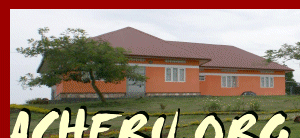|
|
| January
2017 report |
| I've been looking at the latest statistics received from Joyce. Numbers seen at Kabembe and Minakulu, conditions treated, number of operations etc. They are all much as expected, with the usual quiet period over Christmas. I believe with Acheru we've found our level, matching need to budget and staff considerations and how we fit in with the work of other organisations and health services. This is always kept under review with the possibility of change in emphasis, more community or outpatient work etc if circumstances dictate. We're not considering further growth, but nor do we need to consider cutbacks to reduce costs. We can leave what's done to the judgement of the Acheru management and staff and use this period of stability to concentrate on maintaining standards. The statistics of patients treated don't necessarily reflect the developing community work much of which centres on education and changing attitudes to disability. |
| The north remains a concern. The numbers seen are fairly constant, but small relative to the huge area we are trying to cover through rural clinics and referrals from other organisations. A factor in this could be the development of other medical services in the area, and the 'fluid' nature of the situation in the north was a factor in deciding not to build a large permanent base for Acheru there. We wanted the flexibility to adapt to change. Among the numbers seen have been children with very serious problems which we were able to deal with. Some had suffered from previous interventions, and I don't know what their future would have been if we weren't there to help. I believe the work of Acheru continues to set the example for working with and witnessing to disabled children. |
| What lies behind the statistics is that each number represents an individual and we want to ensure every one of them receives the care they need and is exposed to the gospel of Jesus Christ. Bearing in mind the various backgrounds, the extent to which witchcraft may still be practiced, the number of muslim patients, we continue to believe that the first step to an effective witness is high quality care and treatment. This takes place within the context of a Christian family, hearing Bible stories, learning of Jesus, but not put under pressure which could be totally counter productive. What I hear from experts in other fields of Christian work is that this unpressurised inclusion of muslims is most likely to cause them to start asking questions. This witness remains at the core of the Acheru work, and I trust the staff there, working with local churches, volunteers, visiting students etc, to understand the best way to address this against a difficult background. What I think speaks clearly about the influence of the work is the extent to which former patients and their relatives try to maintain their connection to Acheru long after they have returned home. |
| Hazel and I are in South Africa at present, due to return home on 9th April. While here, I'm working on things I hadn't got round to at home including a lot of writing, and cataloguing pictures and case histories. It's encouraging looking at children who have been successfully treated but we should remember we've lost some too. Some are already very sick by the time they are brought to us. I saw one child who was a clear example of the value of Acheru's work even though she didn't survive. She came to us first as a teenager with multiple problems and was eventually returned to her family with arrangements made for essential ongoing medication for her diabetes. We had concerns about her family, but had to return her to them. |
| We became very worried when Harriet, on a follow up community visit, found that the family had moved away leaving no information on where they had gone, and consequently no way of getting medication to the girl. It took a long time but Harriet eventually tracked them down some distance away but by this time she had suffered the most appalling neglect, left sitting on the ground all day with no food or medication. She was like a skeleton, very far gone, so was brought back to Acheru for urgent treatment. |
| She seemed to respond well. She was a bright girl who started to help in various ways at Acheru. At least by now she was old enough to be considered an adult so we didn't have to return her to her family, so the decision was taken that she could remain at Acheru doing whatever work she could. This seemed an ideal arrangement, and it came as a shock when she died, probably as a result of kidney failure. After all she had come through it seems too much damage had been done. This was tragic, but how much worse would it have been if we hadn't found her and brought her back to Acheru where, if only for a short time, she experienced the love she'd never had before. And hers is not an isolated case. |
| Brian Dorman |
|
|
|



